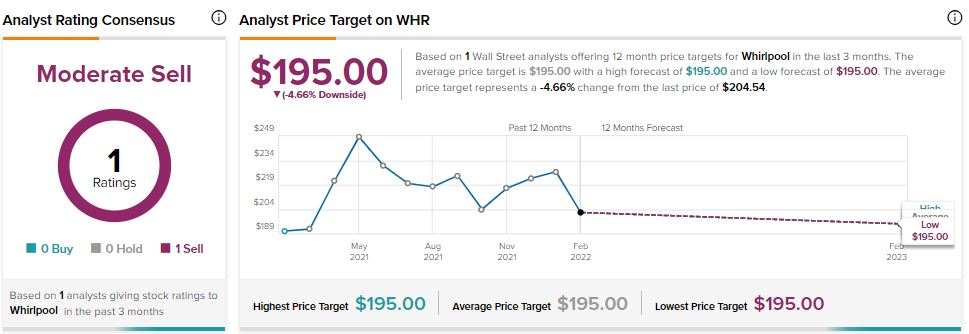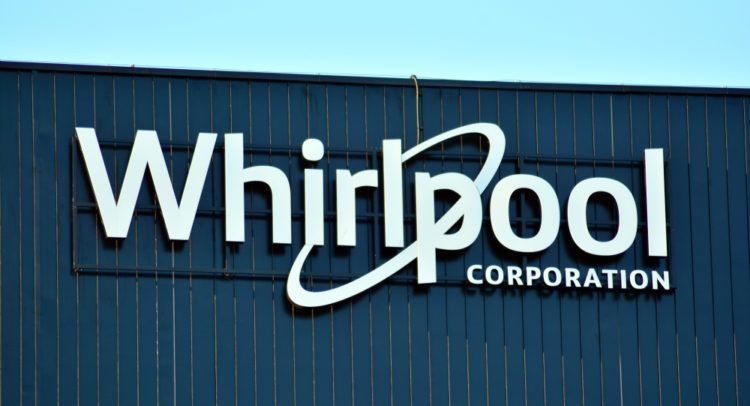Whirlpool (WHR) is an American multinational manufacturer of home appliances. Its brands include KitchenAid, Maytag, Amana, and Brastemp.
Claim 50% Off TipRanks Premium
- Unlock hedge fund-level data and powerful investing tools for smarter, sharper decisions
- Stay ahead of the market with the latest news and analysis and maximize your portfolio's potential
For Q4 2021, Whirlpool reported revenue of $5.8 billion, flat from the same quarter the previous year but slightly below the consensus estimate of $5.9 billion. It posted EPS of $6.14, down from $6.67 in the same quarter the previous year but above the consensus estimate of $5.84.
For full-year 2022, the company expects revenue to grow as much as 6% from the $22 billion it reported in 2021. It anticipates 2022 EPS of between $27 and $29, compared to $28.36 for 2021.
Whirlpool ended Q4 with $3 billion in cash. The company plans to distribute a quarterly cash dividend of $1.75 per share on March 15 and has set February 24 as the ex-dividend date. Whirlpool stock currently offers a dividend yield of 2.91%, compared to the sector average of 1.5%.
With this in mind, we used TipRanks to take a look at the newly added risk factors for Whirlpool.
Risk Factors
According to the new TipRanks Risk Factors tool, Whirlpool’s top risk categories are Production and Macro and Political, each with 6 of the total 27 risks identified for the stock. Legal and Regulatory and Finance and Corporate are the next two major risk categories with 5 and 4 risks, respectively. Whirlpool recently added three new risk factors and updated several previously highlighted risk factors.
In a newly added Legal and Regulatory risk factor, the company informs investors that climate change regulations could require it to modify its manufacturing processes or lead it to other expensive activities. The company further explains that it has set rigorous emission reduction targets as part of its sustainability goals. Whirlpool cautions that its business and reputation may be adversely affected if it fails to achieve its sustainability goals.
In a newly added Macro and Political risk factor, Whirlpool tells investors that unanticipated social, political, and economic events may have a significant adverse impact on its business. It mentions terrorist attacks, armed conflicts, and civil unrest as potential causes of supply chain and manufacturing disruptions.
Whirlpool’s growth plans include increasing revenue from emerging markets, and the strategy may include acquisitions. However, the company cautions in a newly added Macro and Political risk factor that acquisitions could expose it to unanticipated costs and liabilities. Additionally, expanding in emerging markets would increase the company’s exposure to risks associated with international business. It mentions foreign currency exchange rates fluctuations, changes in tax laws, and labor relations issues.

Analysts’ Take
In January, RBC Capital analyst Mike Dahl maintained a Sell rating on Whirlpool stock but raised the price target to $195 from $190. Dahl’s new price target suggests 4.66% downside potential. The analyst noted that Whirlpool’s Q4 earnings beat expectations but that the 2022 outlook appears overly optimistic.

Download the TipRanks mobile app now
To find good ideas for stocks trading at attractive valuations, visit TipRanks’ Best Stocks to Buy, a newly launched tool that unites all of TipRanks’ equity insights.
Read full Disclaimer & Disclosure
Related News:
2 Beaten-Down Stocks to Bottom-Fish With the Insiders
Southwest Airlines Stock: Historically Low Forward EBITDA Valuation
New Fortress Energy: Massive Upside Potential
















